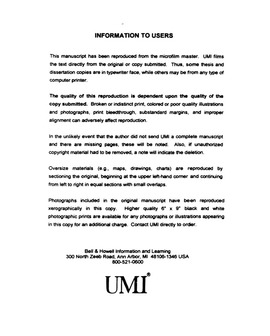| dc.contributor.advisor | Ray, David, | en_US |
| dc.contributor.author | Korb, Charles Michael. | en_US |
| dc.date.accessioned | 2013-08-16T12:30:56Z | |
| dc.date.available | 2013-08-16T12:30:56Z | |
| dc.date.issued | 2000 | en_US |
| dc.identifier.uri | https://hdl.handle.net/11244/5973 | |
| dc.description.abstract | This dissertation is a case study of Congressional-Executive Branch relations with respect to intelligence policy. The project utilizes the methods of secondary source assessment, interviews with key governmental officials, and formal content analysis to highlight important contextual elements that help to explain institutional behaviors and policies since the end of the Cold War. The evolving degree of presidential interest in, and control over, the intelligence community, is assessed. Additionally, the extent and character of post-Cold War Congressional intelligence oversight is found to be unique in several respects. | en_US |
| dc.format.extent | x, 309 leaves ; | en_US |
| dc.subject | United States Foreign relations 1945-1989. | en_US |
| dc.subject | Intelligence service United States. | en_US |
| dc.subject | Legislative power United States. | en_US |
| dc.subject | Executive power United States. | en_US |
| dc.subject | United States Foreign relations 1989- | en_US |
| dc.subject | Political Science, General. | en_US |
| dc.subject | United States. Central Intelligence Agency. | en_US |
| dc.subject | United States. Central Intelligence Agency Officials and employees. | en_US |
| dc.title | Congress, the intelligence community, and the president: Evolving institutional relationships in the Post-Cold War Era. | en_US |
| dc.type | Thesis | en_US |
| dc.thesis.degree | Ph.D. | en_US |
| dc.thesis.degreeDiscipline | Department of Political Science | en_US |
| dc.note | Source: Dissertation Abstracts International, Volume: 61-05, Section: A, page: 2018. | en_US |
| dc.note | Major Professor: David Ray. | en_US |
| ou.identifier | (UMI)AAI9972511 | en_US |
| ou.group | College of Arts and Sciences::Department of Political Science | |
